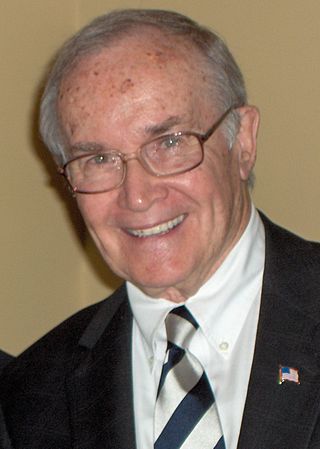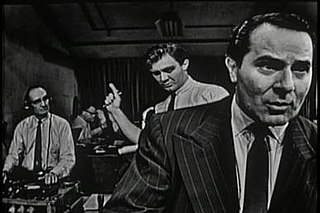Related Research Articles

The DuMont Television Network was one of America's pioneer commercial television networks, rivaling NBC and CBS for the distinction of being first overall in the United States. It was owned by Allen B. DuMont Laboratories, a television equipment and set manufacturer, and began operation on April 13, 1940.

The Jetsons is an American animated sitcom produced by Hanna-Barbera Productions. It originally aired in prime time from September 23, 1962, to March 17, 1963, on ABC, then later aired in reruns via syndication, with new episodes produced from 1985 to 1987. It was Hanna-Barbera's Space Age counterpart to The Flintstones.

Gilligan's Island is an American sitcom created and produced by Sherwood Schwartz. The show's ensemble cast features Bob Denver, Alan Hale Jr., Jim Backus, Natalie Schafer, Tina Louise, Russell Johnson and Dawn Wells. It aired for three seasons on the CBS network from September 26, 1964, to April 17, 1967. The series follows the comic adventures of seven castaways as they try to survive on an island where they are shipwrecked. Most episodes revolve around the dissimilar castaways' conflicts and their unsuccessful attempts to escape their plight, with the ship's first mate, Gilligan, usually being responsible for the failures.
Animation in the United States in the television era was a period in the history of American animation that slowly set in with the decline of theatrical animated shorts and the popularization of television animation during the late 1950s to 1960s, peaked in the 1970s, and ended in the mid-late 1980s. This era is characterized by low budgets, limited animation, an emphasis on television over the theater, and the general perception of cartoons being primarily for children. Due to the perceived cheap production values, poor animation, and mixed critical and commercial reception, this era is sometimes referred to as the Dark Ageof American animation by critics.
The following television-related events took place during 1961.
The following is the 1959–60 network television schedule for the three major English language commercial broadcast networks in the United States. The schedule covers primetime hours from September 1959 through March 1960. The schedule is followed by a list per network of returning series, new series, and series cancelled after the 1958–59 season.
The following is the 1960–61 network television schedule for the three major English language commercial broadcast networks in the United States. The schedule covers primetime hours from September 1960 through March 1961. The schedule is followed by a list per network of returning series, new series, and series cancelled after the 1959–60 season.
The following is the 1961–62 network television schedule for the three major English language commercial broadcast networks in the United States. The schedule covers primetime hours from September 1961 through April 1962. The schedule is followed by a list per network of returning series, new series, and series cancelled after the 1960–61 season.
The following is the 1962–63 network television schedule for the three major English language commercial broadcast networks in the United States. The schedule covers primetime hours from September 1962 through August 1963. The schedule is followed by a list per network of returning series, new series, and series cancelled after the 1961–62 season.
The following is the 1964–65 network television schedule for the three major English language commercial broadcast networks in the United States. The schedule covers primetime hours from September 1964 through August 1965. The schedule is followed by a list per network of returning series, new series, and series cancelled after the 1963–64 season.
Wasteland or waste land may refer to:

Newton Norman Minow was an American attorney who served as chairman of the Federal Communications Commission. He is famous for his 1961 speech referring to television as a "vast wasteland". While still maintaining a law practice, Minow served as the Honorary Consul General of Singapore in Chicago, beginning in 2001.

The first Golden Age of Television is an era of television in the United States marked by its large number of live productions. The period is generally recognized as beginning in 1947 with the first episode of the drama anthology Kraft Television Theater and ending in 1960 with the final episode of Playhouse 90. The Golden Age was followed by the network era, wherein television audiences and programming had shifted to less critically acclaimed fare, almost all of it taped or filmed.
The S. S. Minnow is a fictional charter boat on the hit 1960s television sitcom Gilligan's Island. The ship ran aground on the shore of "an uncharted desert isle" in the south Pacific Ocean, setting the stage for this popular situation comedy. The crew of two were the skipper Jonas Grumby and his first mate Gilligan, and the five passengers were millionaire Thurston Howell III, his wife Lovey Howell, movie star Ginger Grant, professor Roy Hinkley, and farm girl Mary Ann Summers.
Action for Children's Television (ACT) was an American grassroots, nonprofit child advocacy group dedicated to improving the quality of children's television. Specifically, ACT's main goals were to encourage diversification in children's television offerings, to discourage overcommercialization of children's programming, and to eliminate deceptive advertising aimed at young viewers.
The following is the 1956–57 network television schedule for the three major English language commercial broadcast networks in the United States. The schedule covers primetime hours from September 1956 through March 1957. The schedule is followed by a list per network of returning series, new series, and series cancelled after the 1955–56 season.
The 1961–62 daytime network television schedule for the three major English-language commercial broadcast networks in the United States covers the weekday daytime hours from September 1961 to August 1962.
These are the daytime Monday–Friday schedules on all three networks for each calendar season beginning September 1958. All times are Eastern and Pacific. The 1958-1959 season, beginning October 13 for ABC, was its first "full scale daytime programming" schedule.

The Hathaways is a 26-episode situation comedy, which aired on ABC from October 6, 1961, to March 30, 1962, starring Peggy Cass and Jack Weston as suburban Los Angeles "parents" to a trio of performing chimpanzees. Weston portrayed Walter Hathaway, a flabby real estate agent. Cass is his zany bride Elinore, "mother" and booking agent to the Marquis Chimps, named Candy, Charlie, and Enoch. The chimps had earlier appeared on CBS's The Ed Sullivan Show, a Jack Benny special in 1959 and several commercials in 1960.
The broadcast of educational children's programming by terrestrial television stations in the United States is mandated by the Federal Communications Commission (FCC), under regulations colloquially referred to as the Children's Television Act (CTA), the E/I rules, or the Kid Vid rules. Since 1997, all full-power and Class A low-power broadcast television stations have been required to broadcast at least three hours per-week of programs that are specifically designed to meet the educational and informative (E/I) needs of children aged 16 and younger. There are also regulations on advertising in broadcast and cable television programming targeting children 12 and younger, including limits on ad time, and prohibiting the airing of advertising for products related to the program currently airing.
References
- 1 2 3 4 5 Newton N. Minow, "Television and the Public Interest", address to the National Association of Broadcasters, Washington, D.C., May 9, 1961.
- ↑ "Newton Minow: The 'vast wasteland' of television speech" . Retrieved 10 June 2016.
- ↑ Fallows, James (11 May 2011). "Where the Phrase 'Vast Wasteland' Came From". The Atlantic Monthly. Retrieved 12 May 2011.
- ↑ Johnson, Ted (9 May 2011). ""A Vast Wasteland," 50 Years Later". Variety magazine. Archived from the original on 17 May 2011. Retrieved 12 May 2011.
- ↑ Castleman, Harry; Podrazik, Walter J. (1982). Watching TV: Four Decades of American Television . New York: McGraw-Hill. pp. 139–153. ISBN 0-07-010269-4.
- ↑ "Television: The Coming Season". Time . July 27, 1962. Archived from the original on February 19, 2011. Retrieved 2010-11-21.
The producers of The Flintstones have a new family called The Jetsons, who live in outer space.
- ↑ Schwartz, Sherwood (1994). Inside Gilligan's Island. pp. xv. cited in Jarvis, Robert M. (1998). "Legal Tales from Gilligan's Island". Santa Clara Law Review. Santa Clara University Law School. 39: 185. Retrieved 2014-04-01.
- ↑ Radical Software interview with Dennis James, ca. September 1972
- ↑ Newton Minow's Vast Wasteland Speech: How It Changed TV|Time
- ↑ Does Minow Still Think TV Is a 'Vast Wasteland'?|Ad Age (subscription required)
- ↑ How TV's 'Vast Wasteland' Became a Vast Garden|WIRED